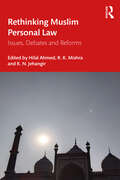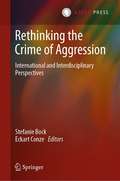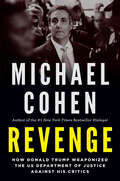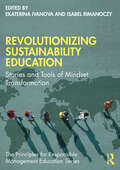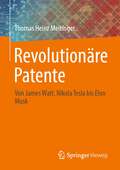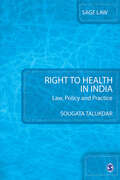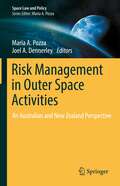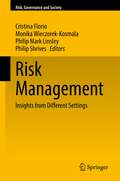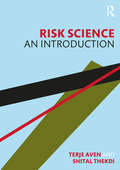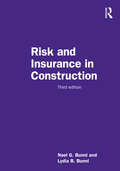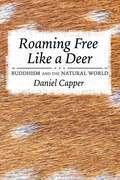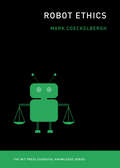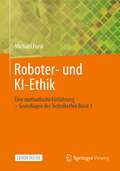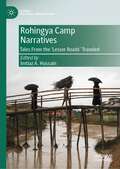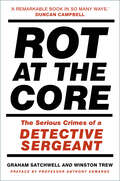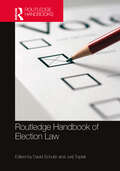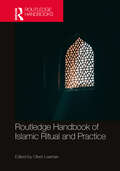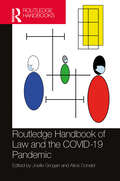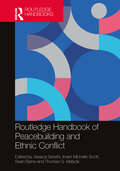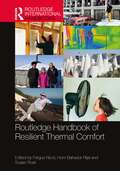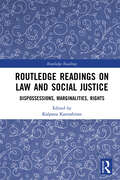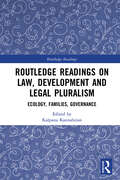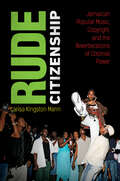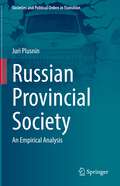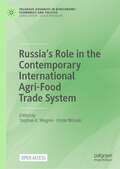- Table View
- List View
Rethinking Muslim Personal Law: Issues, Debates and Reforms
by R. K. Mishra K. N. Jehangir Hilal AhmedThis volume critically analyses Muslim Personal Law (MPL) in India and offers an alternative perspective to look at MPL and the Uniform Civil Code (UCC) debate. Tracing the historical origins of this legal mechanism and its subsequent political manifestations, it highlights the complex nature of MPL as a sociological phenomenon, driven by context-specific social norms and cultural values. With expert contributions, it discusses wide-ranging themes and issues including MPL reforms and human rights; decoding of UCC in India; the contentious Triple Talaq bill and MPL; the Shah Bano case; Sharia (Islamic jurisprudence) in postcolonial India; women’s equality and family laws; and MPL in the media discourse in India. The volume highlights that although MPL is inextricably linked to Sharia, it does not necessarily determine the everyday customs and local practices of Muslim communities in India This topical book will greatly interest scholars and researchers of law and jurisprudence, political studies, Islamic studies, Muslim Personal Law, history, multiculturalism, South Asian studies, sociology of religion, sociology of law and family law. It will also be useful to practitioners, policymakers, law professionals and journalists.
Rethinking the Crime of Aggression: International and Interdisciplinary Perspectives
by Eckart Conze Stefanie BockThis book presents a selection of revised and updated papers presented in September 2018 at the International Conference ‘Rethinking the Crime of Aggression: International and Interdisciplinary Perspectives’, which was held in Marburg, Germany, and hosted by the International Research and Documentation Centre for War Crimes Trials (ICWC). In light of the activation of the jurisdiction of the International Criminal Court concerning the crime of aggression, international experts from various disciplines such as law, history, the social sciences, psychology and economics came together to enhance the understanding of this complex and challenging matter and thereby opened a cross-disciplinary dialogue regarding aggressive war and the crime of aggression: a dialogue that not only addresses the historical genesis of the current situation, the content of the new aggression provisions, their implementation in practice and their possible regulatory effects, but also instigates perspectives for investigating future developments and issues. Stefanie Bock is Professor of Criminal Law, Criminal Procedure, International Criminal Law and Comparative Law in the Department of Law at the Philipps University of Marburg in Germany and Co-Director of the International Research and Documentation Centre for War Crimes Trials. Eckart Conze is Professor of Modern and Contemporary History in the Department of History at the Philipps University of Marburg in Germany and Co-Director of the International Research and Documentation Centre for War Crimes Trials.
Revenge: How Donald Trump Weaponized the US Department of Justice Against His Critics
by Michael CohenThe man the New York State Attorney General credited with inspiring her prosecution of Donald Trump — New York Times number one bestselling author Michael Cohen — tells the behind-the-scenes story of what can happen to you — and what really happened to him — when a President who believes himself to be above the law decides to go after his critics . . . .When Michael Cohen's secret payoff to porn star Stormy Daniels on behalf of Donald Trump made Cohen look like a liability to the by-then-President of the United States, the end to their decade-long relationship came swiftly — with a knock on the door from the FBI. Soon, Cohen would find himself imprisoned — even though he had plenty of evidence to show he was innocent of most of the charges.Meanwhile, with the release of the Steele Dossier, Cohen also found himself battling endless news reports citing the Dossier's claims that he'd had clandestine dealings with Russia — reports that only mounted despite his exoneration by the Mueller Report.In a story now being echoed in recent breaking news stories about IRS persecution of other Trump foes such as former FBI head James Comey and others, Cohen details — in his inimitable blunt language, with absolutely no holds barred and naming names — his attempt to clear his name and tell the truth about Donald Trump. Chillingly, he also makes clear what happens when you try to speak truth to power, and the power knows no bounds.
Revolutionizing Sustainability Education: Stories and Tools of Mindset Transformation (The Principles for Responsible Management Education Series)
by Ekaterina Ivanova and Isabel RimanoczyThere is growing awareness among leading responsible management scholars and practitioners that understanding global wicked problems is insufficient in effecting lasting engagement and changed behaviors. Research indicates that to impact behavior, the mindset has to shift, which leaves the question: How do you shift a mindset? This book guides educators and practitioners, their students and colleagues to take action on finding urgent solutions to the grand challenges stated in the 17 UN Sustainable Development Goals. A Sustainability Mindset is a way of thinking and being that results from a broad understanding of the ecosystem, from social sensitivity and an introspective focus on our personal values and higher self, which finds its expression in actions for the greater good. By promoting a mindset shift, educators in very diverse contexts are laying the foundation for a resilient future. The book presents a collection of over 150 student voices depicting a transformative experience and a shift in their mindset. Seventeen educator/student teams of contributing authors from across five continents describe the activity that prompted those students’ reflections, and the conceptual frameworks that played a role in the selection of the learning goals and activities. The book is written with academic and corporate educators, reflective practitioners, consultants, coaches, trainers and students in mind, and is invaluable in guiding the process of developing a sustainability mindset among participants in the training process.
Revolutionäre Patente: Von James Watt, Nikola Tesla bis Elon Musk
by Thomas Heinz MeitingerVergleicht man das Leben, das Denken und die Schriften der alten Römer oder Griechen mit dem heutigen Leben, wird man keine wesentlichen Unterschiede in der Klarheit der Gedanken oder der Eloquenz der Erzählweise feststellen können. Vergleicht man jedoch die Technologien der alten Römer mit den heute bekannten Technologien, erkennt man, dass auf dem technischen Gebiet gewaltige Fortschritte geschaffen wurden. Entscheidende technische Fortschritte sind immer mit berühmten Erfindern und Wissenschaftlern verbunden. Diese prägen ihre Zeit und das Leben der nachfolgenden Generationen. Auf wichtigen technischen Durchbrüchen werden oft industrielle Imperien errichtet.Dieses Buch zeigt die technischen Aufgaben, denen sich die Erfinder gegenüber sahen, ihre Erfindungen und was aus diesen Erfindungen entstand. Das Buch soll Faszination für Technik vermitteln und zur wirtschaftlichen Realisierung eigener Erfindungen ermuntern, die zumeist durch das Anmelden der Erfindung zum Patent beginnt.
Right to Health in India: Law, Policy and Practice (SAGE Law)
by Sougata TalukdarHealth and human rights are complementary to each other in advancing progress and social justice. Right to Health in India: Law, Policy and Practice examines the fundamental right to health in light of the contemporary human rights discourse. It advocates for a rights-based approach to health that acknowledges the socio-economic dimensions and implications of access to health and dignity of life. This book studies the legislative and policy initiatives designed to protect women, children, HIV/AIDS patients, workers, people with disabilities and all Indian citizens from health hazards and medical malpractice. It explores the constitutional mandates and safeguards regarding right to health in India. The book further discusses the international legal framework on health, analysing it along with the developments in Indian health law. It critically examines the role played by implementing authorities and judiciary in determining the access to and success of right to health in India.
Risk Management in Outer Space Activities: An Australian and New Zealand Perspective (Space Law and Policy)
by Maria A. Pozza Joel A. DennerleyRisk Management in Outer Space Activities assesses selected risks associated with space activities, from an Australian and New Zealand perspective. The book explores the rise of commercial space activities and considers the development of Australia and New Zealand’s regulatory frameworks, and how they are equipped to address new and emerging risks in the space sector.The book examines the juxtaposition of international space law against the domestic legal regimes of Australia and New Zealand, and how these regulatory frameworks are designed to create governance mechanisms to control space risk. Both national jurisdictions approach space risk from the perspective of liability and international legal obligations, but as a result of their different historical space trajectories, their risk approaches differ. This is illustrated by research that suggests that from an Australian point of view, much of its space industry development has been influenced by Cold War era military and national security concerns. On the other hand, the New Zealand perspective is grounded on the rapid market-led commercial development that is currently underway in the country.The book examines a variety of risks that can and do emerge in the course of undertaking space activities. It does this by presenting a series of space risk case studies. There are chapters devoted to examining commercial space risks, space insurance, the risks posed by space debris, cybersecurity and space assets, light pollution as a risk for astronomy and the risks inherent in landing objects on the Moon. The work contained in this book is intended to provide a clear, practical and informed approach to understanding risk management in outer space activities. It will appeal to policy makers, risk professionals, space lawyers, national space agencies as well as academics, researchers and students
Risk Management: Insights from Different Settings (Risk, Governance and Society #20)
by Philip Shrives Monika Wieczorek-Kosmala Cristina Florio Philip Mark LinsleyThis volume offers new, convincing empirical evidence on topical risk- and risk management-related issues in diverse settings, using an interdisciplinary approach. The authors advance compelling arguments, firmly anchored to well-accepted theoretical frameworks, while adopting either qualitative or quantitative research methodologies. The book presents interviews and surveys with risk managers to gather insights on risk management and risk disclosure in practice. Additionally, the book collects and analyzes information contained in public reports to capture risk disclosure and perceptions on risk management impacts on companies’ internal organization. It sheds light on financial and market values to understand the effect of risk management on actual and perceived firm’s performance, respectively. Further, it examines the impacts of risk and risk management on society and the economy.The book improves awareness and advances knowledge on the complex and changeable risk and risk management fields of study. It interweaves among topical, up-to-date issues, peculiar, under-investigated contexts, and differentiated, complementary viewpoints on the same themes. Therefore, the book is a must-read for scholars and researchers, as well as practitioners and policy makers, interested in a better understanding of risk and risk management studies in different fields.
Risk Science: An Introduction
by Terje Aven Shital ThekdiRisk science is becoming increasingly important as businesses, policymakers and public sector leaders are tasked with decision-making and investment using varying levels of knowledge and information. Risk Science: An Introduction explores the theory and practice of risk science, providing concepts and tools for understanding and acting under conditions of uncertainty. The chapters in this work cover the fundamental concepts, principles, approaches, methods and models for how to understand, assess, communicate, manage and govern risk. These topics are presented and examined in a way which details how they relate, for example, how to characterize and communicate risk with particular emphasis on reflecting uncertainties; how to distinguish risk perception and professional risk judgments; how to assess risk and guide decision-makers, especially for cases involving large uncertainties and value differences; and how to integrate risk assessment with resilience-based strategies. The text provides a variety of examples and case studies that relate to highly visible and relevant issues facing risk academics, practitioners and non-risk leaders who must make risk-related decisions. Presenting both the foundational and most recent advancements in the subject matter, this work particularly suits students of risk science courses at college and university level. The book also provides broader key reading for students and scholars in other domains, including business, engineering and public health.
Risk and Insurance in Construction
by Nael G. Bunni Lydia B. BunniThe new 3rd edition of Nael Bunni’s Risk and Insurance in Construction, now co-authored with Lydia Bunni, explains the need for insurance in construction and engineering projects and why it must be incorporated into the Conditions of Contract for such projects. It is unique in bringing together the background of the two topics of 'risk' and 'construction insurance', explaining the flow and the interaction between them and then dealing with how they have been used to formulate the 2017 FIDIC Suite of Contracts and the 2021 Green Book. This edition has been fully updated, and new chapters deal with the latest definitions of 'risk' outlined in ISO 31000: 2009, and specifically explains the principles embodied in the new Clauses 17, 18 and 19 of the Major Suite of the FIDIC forms of contract and how they should be used. An important chapter (Chapter 5) is included, discussing the logical transition from decision-making to risk identification to responsibility for those allocated with particular risks, to the potential liability that results. This includes discussing particular liabilities that may arise for parties typically involved in construction and engineering projects, including developers, owners, contractors and designers. This part of the book links insurance to the law and explains the interaction between the two topics. The correlation between liability and the need for indemnity, which can only be provided properly through insurance, is highlighted. The book is essential reading for practitioners from both the engineering profession and the insurance industry in all types of projects. Engineers who are required to use one of the Major Forms of the FIDIC Suite of Contracts, whether they are designers or contractors, and those involved in the insurance sector, whether brokers, claim consultants or insurance company personnel, will find this book to be an indispensable reference.
Roaming Free Like a Deer: Buddhism and the Natural World
by Daniel CapperBy exploring lived ecological experiences across seven Buddhist worlds from ancient India to the contemporary West, Roaming Free Like a Deer provides a comprehensive, critical, and innovative examination of the theories, practices, and real-world results of Buddhist environmental ethics. Daniel Capper clarifies crucial contours of Buddhist vegetarianism or meat eating, nature mysticism, and cultural speculations about spirituality in nonhuman animals. Buddhist environmental ethics often are touted as useful weapons in the fight against climate change. However, two formidable but often overlooked problems with this perspective exist. First, much of the literature on Buddhist environmental ethics uncritically embraces Buddhist ideals without examining the real-world impacts of those ideals, thereby sometimes ignoring difficulties in terms of practical applications. Moreover, for some understandable but still troublesome reasons, Buddhists from different schools follow their own environmental ideals without conversing with other Buddhists, thereby minimizing the abilities of Buddhists to act in concert on issues such as climate change that demand coordinated large-scale human responses. With its accessible style and personhood ethics orientation, Roaming Free Like a Deer should appeal to anyone who is concerned with how human beings interact with the nonhuman environment.
Robot Ethics (The MIT Press Essential Knowledge series)
by Mark CoeckelberghA guide to the ethical questions that arise from our use of industrial robots, robot companions, self-driving cars, and other robotic devices.Does a robot have moral agency? Can it be held responsible for its actions? Do humans owe robots anything? Will robots take our jobs? These are some of the ethical and moral quandaries that we should address now, as robots and other intelligent devices become more widely used and more technically sophisticated. In this volume in the MIT Press Essential Knowledge series, philosopher Mark Coeckelbergh does just that. He considers a variety of robotics technologies and applications—from robotic companions to military drones—and identifies the ethical implications of their use. Questions of robot ethics, he argues, are not just about robots but, crucially and importantly, are about humans as well. Coeckelbergh examines industrial robots and their potential to take over tasks from humans; &“social&” robots and possible risks to privacy; and robots in health care and their effect on quality of care. He considers whether a machine can be moral, or have morality built in; how we ascribe moral status; and if machines should be allowed to make decisions about life and death. When we discuss robot ethics from a philosophical angle, Coeckelbergh argues, robots can function as mirrors for reflecting on the human. Robot ethics is more than applied ethics; it is a way of doing philosophy.
Roboter- und KI-Ethik: Eine methodische Einführung – Grundlagen der Technikethik Band 1
by Michael FunkWas ist die Ethik der Roboter? Was ist KI-Ethik? Was sind „moralische Maschinen“? Welchen Gesetzen sollen sie folgen? Haben wir die Roboter, die wir brauchen, und brauchen wir die Roboter, die wir haben?In vorliegendem Buch werden Grundlagen der Ethik im Umgang mit Robotern, Drohnen und KI allgemeinverständlich dargestellt. Hierzu zählt die Unterscheidung von Moral, Ethik und Ethos sowie deren Anwendung auf Menschen und Maschinen. Kriterien, Fehlschlüsse und Robotergesetze werden vorgestellt, wie auch in die umfassende Gegenwartsdebatte übersichtlich eingeführt. Grafiken und Beispiele bieten Orientierung in einem hochaktuellen und komplexen Feld.Als methodische Einführung richtet sich vorliegendes Buch an Ingenieurwissenschaftler*innen, Informatiker*innen und Geisteswissenschaftler*innen im Berufsalltag, aber auch an interessierte Lai*innen, die Grundlagen der Ethik kennen lernen wollen. Es bildet den ersten, in sich abgerundeten Teil der Buchreihe Grundlagen der Technikethik.Mit einem Geleitwort von Yvonne Hofstetter.
Rohingya Camp Narratives: Tales From the ‘Lesser Roads’ Traveled (Global Political Transitions)
by Imtiaz A. HussainThis book presents thirteen chapters which probe the “tales less told” and “pathways less traveled” in refugee camp living. Rohingya camps in Bangladesh since August 2017 supply these “tales” and “pathways”. They dwell upon/reflect camp violence, sexual/gender discrimination, intersectionality, justice, the sudden COVID camp entry, human security, children education, innovation, and relocation plans. Built largely upon field trips, these narratives interestingly interweave with both theoretical threads (hypotheses) and tapestries (net-effects), feeding into the security-driven pulls of political realism, or disseminating from humanitarian-driven socioeconomic pushes, but mostly combining them. Post-ethnic cleansing and post-exodus windows open up a murky future for Rohingya and global refugees. We learn of positive offshoots (of camp innovations exposing civil society relevance) and negative (like human and sex trafficking beyond Bangladeshi and Myanmar borders), as of navigating (a) local–global linkages of every dynamic and (b) fast-moving current circumstances against stoic historical leftovers.
Rot at the Core: The Serious Crimes of a Detective Sergeant
by Graham Satchwell Winston TrewIn March 1972, four young black men were arrested by a specialist pickpocket squad at Oval Underground Station and charged with theft and assault of police officers. Sentenced to two years in prison, the case seemed straightforward and credible to the judge and jury who convicted them – but these young men were completely innocent, victims of endemic police corruption. The real criminal in this case was the notorious DS Derek Ridgewell, later proven to be heavily involved in organised crime.Graham Satchwell, at one time Britain’s most senior railway detective, has worked with Oval Four victim Winston Trew to reveal the rotten culture that not only enabled Ridgewell to operate as he did, but also to subsequently organise major thefts of property worth in excess of £1 million. Winston Trew’s case was finally overturned in December 2019, but the far-reaching ramifications of Ridgewell’s shocking activities has irreparably damaged many lives and must never be forgotten.
Routledge Handbook of Election Law
by David Schultz and Jurij ToplakGovernments need rules, institutions, and processes to translate the will of the people into functioning democracies. Election laws are the rules that make that happen. Yet across the world various countries have crafted different rules regarding how elections are conducted, who gets to vote, who is allowed to run for office, what role political parties have, and what place money has in the financing of campaigns and candidates. The Routledge Handbook of Election Law is the first major cross-national comparative reference book surveying the electoral practices and law of the major and emerging democracies across the world. It brings together the leading international scholars on election law and democracy, examining specific issues, topics, or the regions of the world when it comes to rules, institutions, and processes regarding how they run their elections. The result is a rich volume of research furthering the legal and political science knowledge about democracies and the challenges they face. Scholars interested in election law and democracy, as well as election officials, will find the Routledge Handbook of Election Law an essential reference book.
Routledge Handbook of Islamic Ritual and Practice
by Oliver LeamanRitual and practice are one of the most distinctive features of religion, and they are linked with its central beliefs. Islam is no exception here, and this Handbook covers many aspects of those beliefs and practices. It describes the variety of what takes place but mainly why, and what the implications of both the theory and practice have for our understanding of Islam. The book includes accounts of prayer, food, pilgrimage, mosques, and the various legal and doctrinal schools that exist within Islam, with the focus on how they influence practice. The volume is organized in terms of texts, groups, practices, places, and others. An attempt has been made to discuss the wide range of Muslim ritual and practice and provide a sound guide to this significant aspect of the religious life of one of the largest groups of believers in the world today.
Routledge Handbook of Law and the COVID-19 Pandemic (Routledge Handbooks in Law)
by Joelle Grogan and Alice DonaldThe COVID-19 pandemic not only ravaged human bodies but also had profound and possibly enduring effects on the health of political and legal systems, economies and societies. Almost overnight, governments imposed the severest restrictions in modern times on rights and freedoms, elections, parliaments and courts. Legal and political institutions struggled to adapt, creating a catalyst for democratic decline and catastrophic increases in poverty and inequality. This handbook analyses the global pandemic response through five themes: governance and democracy; human rights; the rule of law; science, public trust and decision making; and states of emergency and exception. Containing 12 thematic commentaries and 25 chapters on countries of diverse size, wealth and experience of COVID-19, it represents the combined effort of more than 50 contributors, including leading scholars and rising voices in the fields of constitutional, international, public health, human rights and comparative law, as well as political science, and science and technology studies. Taking stock after the onset of global emergency, this book provides essential analysis for politicians, policy-makers, jurists, civil society organisations, academics, students and practitioners at both national and international level on the best, and most concerning, practices adopted in response to COVID-19 – and key insights into how states and multilateral institutions should reform, adapt and prepare for future emergencies.
Routledge Handbook of Peacebuilding and Ethnic Conflict
by Sean Byrne Imani Michelle Scott Jessica Senehi Thomas G. MatyókThis handbook offers a comprehensive analysis of peacebuilding in ethnic conflicts, with attention to theory, peacebuilder roles, making sense of the past and shaping the future, as well as case studies and approaches. Comprising 28 chapters that present key insights on peacebuilding in ethnic conflicts, the volume has implications for teaching and training, as well as for practice and policy. The handbook is divided into four thematic parts. Part 1 focuses on critical dimensions of ethnic conflicts, including root causes, gender, external involvements, emancipatory peacebuilding, hatred as a public health issue, environmental issues, American nationalism, and the impact of the COVID-19 pandemic. Part 2 focuses on peacebuilders’ roles, including Indigenous peacemaking, nonviolent accompaniment, peace leadership in the military, interreligious peacebuilders, local women, and young people. Part 3 addresses the past and shaping of the future, including a discussion of public memory, heritage rights and monuments, refugees, trauma and memory, aggregated trauma in the African-American community, exhumations after genocide, and a healing-centered approach to conflict. Part 4 presents case studies on Sri Lanka’s postwar reconciliation process, peacebuilding in Mindanao, the transformative peace negotiation in Aceh and Bougainville, external economic aid for peacebuilding in Northern Ireland, Indigenous and local peacemaking, and a continuum of peacebuilding focal points. The handbook offers perspectives on the breadth and significance of peacebuilding work in ethnic conflicts throughout the world. This volume will be of much interest to students of peacebuilding, ethnic conflict, security studies, and international relations.
Routledge Handbook of Resilient Thermal Comfort (Routledge International Handbooks)
by Fergus NicolThis book brings together some of the finest academics in the field to address important questions around the way in which people experience their physical environments, including temperature, light, air-quality, acoustics and so forth. It is of importance not only to the comfort people feel indoors, but also the success of any building as an environment for its stated purpose. The way in which comfort is produced and perceived has a profound effect on the energy use of a building and its resilience to the increasing dangers posed by extreme weather events, and power outages caused by climate change. Research on thermal comfort is particularly important not only for the health and well-being of occupants but because energy used for temperature control is responsible for a large part of the total energy budget of the built environment. In recent years there has been an increasing focus on the vulnerabilities of the thermal comfort system; how and why are buildings failing to provide safe and agreeable thermal environments at an affordable price? Achieving comfort in buildings is a complex subject that involves physics, behaviour, physiology, energy conservation, climate change, and of course architecture and urban design. Bringing together the related disciplines in one volume lays strong, multi-disciplinary foundations for new research and design directions for resilient 21st century architecture. This book heralds workable solutions and emerging directions for key fields in building the resilience of households, organisations and populations in a heating world.
Routledge Readings on Law and Social Justice: Dispossessions, Marginalities, Rights (Routledge Readings)
by Kalpana KannabiranRoutledge Readings on Law and Social Justice: Dispossessions, Marginalities, Rights presents some of the finest essays on social justice, rights and public policy. With a lucid new Introduction, it covers a vast range of issues and offers a compelling guide to understanding law and socio- legal studies in South Asia. The book covers critical themes such as the jurisprudence of rights, justice, dignity, with a focus on the regimes of patriarchy, labour and dispossession. The fourteen chapters in the volume, divided into three sections, examine contested sites of the constitution, courts, prisons, land and complex processes of migration, trafficking, digital technology regimes, geographical indications and their entanglements. This multidisciplinary volume foregrounds the politics and plural lives of/ in law by including perspectives from major authors who have contributed to the academic and/ or policy discourse of the subject. This book will be useful to students, scholars, policymakers and practitioners interested in a nuanced understanding of law, especially those studying law, marginality and violence. It will serve as essential reading for those in law, socio- legal studies, legal history, South Asian studies, human rights, jurisprudence and constitutional studies, gender studies, history, politics, conflict and peace studies, sociology and social anthropology. It will also appeal to legal historians and practitioners of law, and those in public administration, development studies, environmental studies, migration studies, cultural studies, labour studies and economics.
Routledge Readings on Law, Development and Legal Pluralism: Ecology, Families, Governance (Routledge Readings)
by Kalpana KannabiranRoutledge Readings on Law, Development and Legal Pluralism presents some of the finest essays on social justice, environment, rights and governance. With a lucid new Introduction, it covers a vast range of issues and offers a compelling guide to understanding the harm and risk relating to biodiversity, agro-ecology, disaster, and forest rights. The book covers critical themes such as ecology, families and governance and establishes the trajectory of contemporary ecology and law in South Asia. The thirteen chapters in the volume, divided into three sections, trace violence and marginality in the plurality of families and their laws in India, as well as discuss community-based just practices. With debates on development, governance and families, the book highlights the politics and practices of law making, law reform and law application. This multi-disciplinary volume foregrounds the politics and plural lives of/in law by including perspectives from major authors who have contributed to the academic and/or policy discourse of the subject. This book will be useful to students, scholars, policymakers, practitioners and the general reader interested in a nuanced understanding of law, especially those studying law, marginality, kinship and indigeneity studies. It will serve as essential reading for those in law, socio-legal studies, environment studies and ecology, social exclusion studies, development studies, South Asian studies, human rights, jurisprudence and constitutional studies, gender studies, history, politics, conflict and peace studies, sociology and social anthropology. It will also appeal to legal historians and practitioners of law, environmentalists, and those in public administration.
Rude Citizenship: Jamaican Popular Music, Copyright, and the Reverberations of Colonial Power
by Larisa Kingston MannIn this deep dive into the Jamaican music world filled with the voices of creators, producers, and consumers, Larisa Kingston Mann—DJ, media law expert, and ethnographer—identifies how a culture of collaboration lies at the heart of Jamaican creative practices and legal personhood. In street dances, recording sessions, and global genres such as the riddim, notions of originality include reliance on shared knowledge and authorship as an interactive practice. In this context, musicians, music producers, and audiences are often resistant to conventional copyright practices. And this resistance, Mann shows, goes beyond cultural concerns.Because many working-class and poor people are cut off from the full benefits of citizenship on the basis of race, class, and geography, Jamaican music spaces are an important site of social commentary and political action in the face of the state's limited reach and neglect of social services and infrastructure. Music makers organize performance and commerce in ways that defy, though not without danger, state ordinances and intellectual property law and provide poor Jamaicans avenues for self-expression and self-definition that are closed off to them in the wider society. In a world shaped by coloniality, how creators relate to copyright reveals how people will play outside, within, and through the limits of their marginalization.
Russian Provincial Society: An Empirical Analysis (Societies and Political Orders in Transition)
by Juri PlusninThis book presents a unique analysis of modern Russian provincial society. Based on detailed empirical evidence, it develops a theoretical model of Russian provincial society in the late 20th century and the early 21st century. The book explains how under the conditions of catastrophic changes, Russian provincial societies have undergone a structural transformation. It further sheds light on the transformation of the economic behavior of the population and households with regard to economic practices, crafts, and revived archaic forms of labor behavior. Summarizing the extensive empirical evidence, the book puts forward the concept of complementarity of two social structures at the local level: a ground "soft communal" structure and a "tightening with an iron hoop" estate state structure. Next, it discusses the stability and resistance of the local social structure to external political disturbances. Based on the presented analysis, the book introduces several independent criteria on the basis of which it establishes the typology of all empirically observed forms of societies. Subsequently, the book identifies six main types of Russian provincial societies. It explains how depending on the type, the different societies either adapt to political and economic changes in different ways, stay unchanged or transform their structure. The book will appeal to students, scholars, and researchers of economics, political science, sociology, and anthropology, interested in a better understanding of transformation studies, population and household economics, provincial societies, as well as Russian societal structures.
Russia’s Role in the Contemporary International Agri-Food Trade System (Palgrave Advances in Bioeconomy: Economics and Policies)
by Stephen K. Wegren Frode NilssenThis Open Access book analyses the emergence of Russia as a global food power and what it means for global food trade. Russia's strategy for food production and trade has changed significantly since the end of the Soviet period, and this is the first book to take account of Russia's rise as a food power and the global implications of that rise. It includes food trade policy and practice, and developments in regional food trade. This book will be of interest to academics and practitioners in agricultural economics, international trade, and international food trade.
